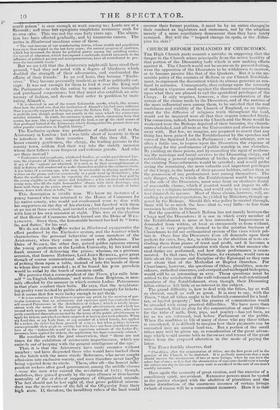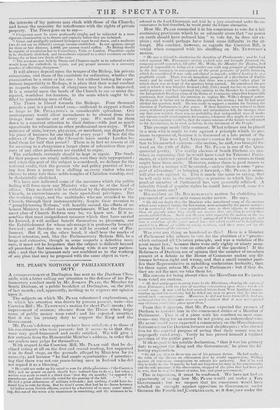CHURCH REFORM DEMANDED BY CHURCHMEN.
THE High Church party commit a mistake in supposing that the danger to the Church arises principally from the active hostility of that portion of the Dissenting body which is now making efforts against it. The Church would not be secure on its present footing, were the opposition of the Dissenters to be withdrawn tomorrow, or to become passive like that of the Quakers. But it is the ml- serable policy of the enemies of Reform in our Church Establish- ment, to represent the discontent which its abuses generate as con- fined to sectaries. Consequently, they enlarge upon the necessity of making a vigorous stand against the threatened encroachments upon what they are pleased to call the apostolical privileges of the Clergy. It only requires, however, a due consideration of the nature of the claims made by the Dissenters, and of the motives of the more influential men among them, to be satisfied that the real usefulness and stability of the Church of England, as an instru- ment for the diffusion of religious truth throughout the land, would not be impaired were all that they require conceded freely. The connexion, indeed, between the Church and the State would be weakened were the Bishops deprived of their baronies, the church- rates abolished, and all tests at the Universities and elsewhere done away with. But few, we imagine, are prepared to assert that any thing has been gained for the Establishment by the speeches and votes of the Spiritual Lords in Parliament ; or the attempt, now so often a futile one, to impose upon the Dissenters the expense of providing for the performance of public worship in our churches. By yielding on these points, and by conceding the right of perform- ing the marriage and burial services to the Dissenting clergy, and establishing a general registration of births, the great majority of the existing Nonconformists would be satisfied; and would prefer seeing the remaining, the more valuable and important privileges of the Clergy, in the hands of their present holders, rather than in the possession of any predominant sect among themselves. The only danger, then, to which the Establishment would be exposed on the side of' the Dissenters, must arise from an obstinate denial of reasonable claims, which if granted would not impair its effi- ciency as a religious institution, and would only to a very small ex- tent diminish its income. Most of these claims, however, will, ac- cording to general expectation, be ) ielded by Ministers, though op- posed by the Bishops. Should this wise policy be carried through, there will be so much the less—that is, very little—to fear from sectarian hostility in future.
But the question of Church Reform lies not merely between the Clergy and the Dissenters: it is one in which every member of the Establishment is more or less interested. Improvement is demanded from within, at least as strenuously as from without. Nay, it is very properly deemed to be the peculiar business of Churchmen to rid our ecclesiastical system of the vices which pol- lute it. Once free the Dissenters from all demands upon their pockets for rates, fees, &c., in addition to the abolition of tests ex- cluding them from places of trust and profit, and it becomes a matter of secondary consideration with them in what manner cle- rical duties are performed, and how their performance is retnu.! nerated. In that case, the Unitarians, for example, would care as little about the income and discipline of the Episcopal as they care now about that of the Methodist or Baptist churches. For Churchmen, however, the questions of tithes, pluralities, non-re- sidence, cathedral sinecures, and overpaid and underpaid bishoprics, would still be as interesting as ever. These questions must be settled to the satisfaction of the well-informed and well-intentioned members of the Establishment, even though their Dissenting fellow-citizens felt little or no interest in the subject.
The grand difficulty is, hew to deal with the tithes, lay as well as clerical, small as well as great. It is easy to say, with the Times," that all tithes ought to be forthwith commuted for a land. tax, or landed property ;" but the process of commutation would be attended with many practical difficulties. We have more than once observed, that no plan for the commutation of small tithes— for the tithe of milk, fruit, pigs, and poultry—has yet been, as far as we are informed, laid before Parliament or the public. When the condition in life of many of those who pay these tithes is considered, it is difficult to imagine how their payments can be converted into an annual land-tax. But a portion of the small tithes may well be given up, in consideration of the great advan- tage which would accrue both to the owner and tenant of the great tithes from the proposed alteration in the mode of paying the latter.
The Times forcibly observes, that
" Pluralities, after the commutation of' tithes, are the first great evil in the practice of the Chords to be abolished. It is perfectly montrous that a man should receive the emoluments of two or more livings, when he can earn the salary but of one ; as it is that the abomination of sinecures should exist whereby the silbsistence due to the cure of many souls is sacrificed to the care of one man's worldly interests."
Here again the necessity of great caution, and the exercise of a conciliatory spirit, are evident. Extensive powers must be vested in the parties charged with the abolition of pluralities and the better distribution of the enormous incomes of certain livings (which of course will be a concomitant measure). Here it is that
the interests of lay patrons may clash with those of the Church; and hence the necessity for interference with the rights of private property. The Times goes on to say- " Clergymen must be more profoundly taught, and be subjected to a more rigorous examination as to fitness and capacity before they are ordained. Creat and prodigally endowed bishoprics must be cut down, and a moderate (we do not say an illiberal) average income established. In our opinion, except for three or four dioceses, 4,0001. per annum would suffice. No Bishop should be capable of translation but to Canterbury, York, or London. Pluralities ought to be absolutely abolished, and incumbents enjoined to a strict residence on their livings for at least two thirds of the year. " The revenues now held by Demur and Chapters ought to be reduced to what would keep the cathedrals in repair, and pay proper incomes to a necessary number of officiating clergymen."
editors of the Times- and the Chronicle leave smoky London be- hind them for half that period ? There is in fact no reason at all for securing to a clergyman a larger share of relaxation than per- sons of any other profession are enabled to enjoy.
The cathedrals certainly should be kept in repair. The funds for that purpose are amply sufficient, were they duly appropriated : and when this part of the subject is considered, we do hope for the national credit, that the present vile and paltry practice of levy- ing fees from a penny to a shilling on every visitor who may chalice to stray into those noble temples of Christian worship, may be disdainfully abolished.
We have now indicated some of the measures which the public feeling will force upon any Ministry who may be at the head of affairs. They no doubt will be withstood by the dignitaries of the Church, as encroachments on their apostolical privileges. But the working clergy, and the multitudes whware attached to the Church, through their instrumentality, despite their aversion to " pamphleteering Bishops," will heartily second the efforts of an honest Ministry to effect such encroachments. What the Govern- ment plan of Church Reform may be, we know not. If it re- sembles that most insignificant measure which they have carried for Ireland, it will neither benefit themselves as placemen, nor the Establishimmt for whose advantage it is professedly brought forward; and therefore we trust it will be scouted out of Par- liament. But if, on the other hand, it shall bear the marks of honest intention, and, like the Parliamentary Reform Bill, be a large and extensive, though in some respects a defective mea- sure, it must not be forgotten that the subject is difficult beyond all precedent; that mistakes in dealing with it are very pardon- able ; and that the ignorant only are confident as to the working of any plan that may be proposed with the same object in view.
down to a constant attention to their duties—with just as much to the Ariiitocracy, to be used, EH before, lo) the detriment of the People."
livings four months out of every year. We would tie them























 Previous page
Previous page